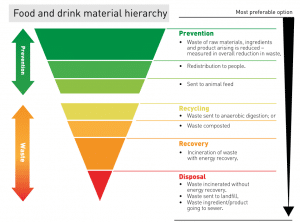MEMBER PRESS RELEASE - ‘Here’s to you – Mrs Robinson’ Liz Robinson would much prefer…
Anaerobic Digestion trade association welcomes Defra’s separate food waste collections in England announcement.
Anaerobic Digestion trade association welcomes Defra’s separate food waste collections in England announcement.
Today, Defra published its long-awaited response to the Consultation on Consistency in Household and Business Recycling in England setting out guidelines and timelines for Local Authorities (LAs) to roll out food waste collections.
Charlotte Morton OBE, Chief Executive of the Anaerobic Digestion and Bioresources Association (ADBA), said: “ About time! – was our first reaction as separate food waste collections have been on the agenda for many years now, with the deadlines repeatedly delayed (1).
Separate food waste collections are the cornerstone for an effective implementation of Defra’s Food and Drink Waste Hierarchy and now Local Authorities and anaerobic digestion (AD) operators can plan with confidence to put contracts and infrastructure in place to ensure inedible food waste goes to AD treatment as the first recycling option. The food waste collected will provide an invaluable new source of feedstock for AD plants to produce renewable gas for heat, electricity and transport fuel, and biofertilisers for soil health and improved crop yields (2).
It’s a great step forward to establish a circular economy around food waste and food production for the benefit of all, and to ensure increased energy and food security in England. We’re all winners in this and it is imperative that no further delays are incurred in rolling out separate food waste collections.”
(1) The response from Defra was due in 2021. The delays created a state of paralysis for LAs, which, without clear timeframes and funding information, had been unable to work toward their legal targets proactively. The initial deadline for mandatory separate food waste collection in England was 2023 – ie this year.
(2) Under the Green Gas Support Scheme, AD operators are required to generate at least 50% of biogas from waste.
-ENDS –
For further information, contact:
Jocelyne Bia, Senior Communications Consultant
e: jocelyne.bia@adbioresources.org ; t: +44 (0)20 3176 0592
Notes to editors
- Keys points to Defra’s consultation response in relation to separate food waste collections include:
- Businesses and organisations within the public sector should have food waste collections in place by the end of March 2025. Households are to follow by the end of March 2026, and then small businesses by the end of March 2027. These dates may be subject to exceptions and there will be an upcoming consultation to address them.
- Councils will have the option to collect food and garden waste together, streamlining recycling into a simpler process and forgoing the need for a written assessment. However, it is expected that this will not have a significant impact because food waste collection will be required on a weekly basis.
- Initial capital funding for food waste collections will likely be given to councils in early 2024 with a deadline of the end of this financial year (March 2024). Ongoing costs for collections will be covered by annual bids.
- The Food and Drink Waste Hierarchy has been established by Defra to provide guidelines for all industries that generate food surplus. It ranks waste management options according to what is best for the environment, giving top priority to preventing waste in the first place (which separate food waste collections have demonstrated to deliver). Then when waste is created, it gives priority to recycling – with AD as the preferred option – then recovery (e.g. incineration), and last of all disposal (e.g. landfill).

- The Anaerobic Digestion and Bioresources Association (ADBA) is the trade association for the UK anaerobic digestion (AD) and biogas industry. ADBA’s vision is to see the full potential of the UK AD industry realised so it can help the UK achieve its emissions targets and other policy goals, creating a truly circular economy. www.adbioresources.org.
- Anaerobic Digestion (AD) is a ready-to-use technology which transforms organic wastes such as food and agricultural waste, sewage, manure and slurries into biogas/biomethane, a biofertiliser called digestate, bio-CO2 and other valuable bioresources for application in the energy, agriculture and transport sectors. How AD works.

- About the AD industry
- There are currently 723 AD plants operational in the UK.
- The entire industry digests approximately 46 million tonnes of organic material each year – organic material that would otherwise emit greenhouse gas if left untreated in landfill.
- An estimated 19.9 TWh of biogas is produced each year by the AD industry – this green gas is either used to generate electricity and heat via a combined heat and power (CHP) unit or upgraded to biomethane and injected directly into the national gas grid. This is enough to heat 1.6 million UK homes.
- The industry currently delivers 1% greenhouse gas savings in the UK every year.
- An estimated 4,800 people are currently employed in the AD and biogas industry in the UK.
- Fully deployed, by 2030, the UK AD and biogas industry expected to:
- create 30,000 direct and 30,000 indirect jobs.
- save the UK 27m t of CO2 equivalent = taking 1/3rd of all cars off the road, by 2030.
- heat 4.5-6.4 million UK homes with the 8 billion m3 of biomethane generated.



